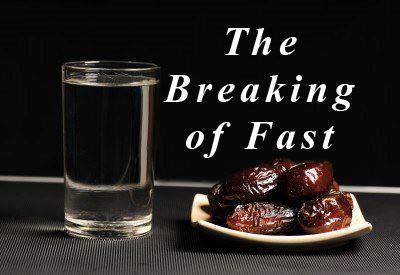IFTAR IN ISLAMAn absolute fast is normally defined as abstinence from all food and liquid for a defined period, usually a single day (from sunrise to sunset), or several days. A Muslim starts his fast by eating food before sunrise and breaks his fast after sunset. This breaking of fast is called as Iftaar.[1]
Definition A meal served at the end of the day during Ramadan, to break the day’s fast is known as Iftar or Iftaar. It is pronounced as “if-tar” (noun). Also known as fitoor. [2]
HadithNarrated Anas (R): “The Messenger of Allah (May Allah honour Him and grant Him peace) used to break his fast before offering (Maghrib) Prayer with some fresh dates, but if there were no fresh dates, he would take a few dry dates and if there were no dry dates he would take a few drops of water.” Sunan Abu Dawud 2348 and 2349, Tirmidhi 3:79Riyad as-Salihin1238 and 1239.
Breaking the fast hastilyHastening to break the fast without delay is from the Sunnah of the Prophet (صلى الله عليه و سلم). Hastening means to break the fast immediately after sunset without any further delay. Some people are hesitant to break the fast, even after the sunset is finished. However, this was the practice of the Jews and Christians during the Prophet’s (May Allah honour Him and grant Him peace) era. Therefore, he (May Allah honour Him and grant Him peace) commanded every Muslim to contradict the Jews and Christians and hasten to break the fast immediately after sunset.
Narrated Sahl ibn Sa’d (may Allah be pleased with him): Allah’s Messenger, Prophet Muhammad (صلى الله عليه و سلم) said: “People will continue to be all right as long as they hasten in the breaking of the fast”.Sahih al Bukhari Vol 3:178, Sahih Al Muslim 2417 and Riyad us Salihin1233.
The Deen (way of Life as prescribed by Allah) will not cease to be uppermost as long as the people hasten to break the fast, since the Jews and the Christians delay it. Abu Dawood Vol 2:305 and Ibn Hibban 224.
Du’aa (supplication) after breaking the fast According to some scholars like Shaykh ibn Uthaymeen Rahimahullaah it it permitted to read this dua after breaking the fast. Fatawa Arkaanul-Islaam ذَهَبَ الظَّمَأُ وَابْتَلَّتِ الْعُرُوقُ وَثَبَتَ الأَجْرُ إِنْ شَاءَ اللَّهُ “Zahabazzama’ wabtallat-al uruqa wa sabat-al-ajru Insha-Allah”- Translation of the meaning of this supplication in English: “The thirst is gone and the veins are moistened and the reward is confirmed if Allah wills”. Sunan Abi dawud 2357; its isnaad was classed as hasan by al-Daaraqutni, 2/185. [3] [1] http://www.islambasics.com/view.php?bkID=137&chapter=1 [2] http://islam.about.com/library/glossary/bldef-iftar.htm [3] http://www.islambasics.com/view.php?bkID=137&chapter=1 |
.

